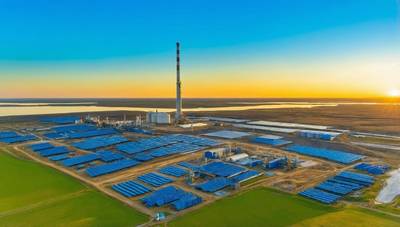Bousso: TotalEnergies' ROI-TotalEnergies power play shows Big Oil how to make energy transition work
TotalEnergies of France is betting heavily on renewables and power, positioning itself as a leader in the global energy demand wave. It also offers investors an alternative to its rivals who are doubling down on gas and oil.
Since 2022, the strategies of European oil companies have been in a constant state of flux. The sanctions and full-scale Russian invasion of Ukraine created an energy shock which prompted governments to focus on the near-term security rather than the long-term transition. Shell and BP refocused on their legacy businesses, instead of investing billions in renewables. They aligned with Exxon Mobil and Chevron.
TotalEnergies CEO Patrick Pouyanne, despite investor pressure, largely adhered to the strategy he first laid out in 2020. This strategy strikes a balance between diversification in power and renewables and growth in oil and gas core operations. This strategy was clearly displayed on Monday, when TotalEnergies acquired a 50% stake of the Western European power platform owned by Czech energy company EPH in an all-stock deal worth 5.1 billion euros ($5.92 billion).
EPH, owned by Czech billionaire Daniel Kretinsky in majority, has over 14 gigawatts in flexible capacity that is in operation or being built, including biomass and gas-fired power plants, as well as battery systems, in Italy, France and the Netherlands.
TotalEnergies, one of Europe's largest gas and biomass generators, will now have a capacity of 13.5 GW.
The French energy giant will no longer have to invest in new power generation, which is expected to increase cashflow by 750 million dollars per year. This deal also reduces annual capital expenditures from $1 billion to $14 billion to $16 billion.
Power Play
TotalEnergies' goal is to generate 100-120 terawatts of electricity worldwide by 2030. This compares to 41 TWh by 2024. The main reason for this is to expand solar and wind energy. This is equivalent to more than 4% of annual EU consumption.
TotalEnergies, it is true, has reduced its investments in renewables in recent years due to the high oil and gas price and lower returns from solar and wind. In September, the company announced that it would cut its annual spending for its integrated power business between $3 billion to $4 billion.
TotalEnergies’ power business is far smaller than the company’s core oil and natural gas businesses. These businesses accounted for 88% of TotalEnergies’ adjusted net income in the third-quarter, which was $4.7 billion. When it comes to growth, however, the power industry is far ahead. TotalEnergies' goal is to triple its current renewable power generation to 100 GW, while oil and gas production will increase by 3% annually by 2030. TotalEnergies has set a target to triple renewables and battery capacity in Europe between now and 2030, and to increase gas and biomass production by 40%.
Shell and BP, on the other hand, have recently sold or spun-off most of their renewable energy generation assets. Shell's net renewable generation was just 4 GW at the end of September compared to 19 GW by TotalEnergies. Exxon, Chevron and other companies have modest plans for investing in gas-fired generation in the United States. Italian energy giant Eni has, like its French counterpart, stuck to its energy transformation strategy. However, it took an unusual path in spinning off its retail and renewables arm as a separate business to attract outside investment. Plenitude aims to triple the renewables generation capacity of its business to 15 GW in 2030.
It takes time.
Investors have reacted coolly so far to TotalEnergies’ strategy. TotalEnergies' shares are up 14% since 2020. Exxon shares have risen 67%, Chevron shares 29%, Shell shares 27%, and BP shares have fallen 3%.
Pouyanne said recently that he plans to increase TotalEnergies’ power business “step by step” in order to keep up with the expected rise in electricity consumption due to electric vehicles and data centers.
Pouyanne, speaking at the Energy Intelligence Forum held in October, said: "The transition is inevitable but will take time."
TotalEnergies never had a flashy clean energy strategy. It has always tried to grow its oil and gas business while pivoting to renewables and power. This steady realism is exactly what the energy transformation needs.
Subscribe to my Power Up newsletter to receive my weekly column, plus additional energy insights and links trending stories in your mailbox every Monday and Thursday. Subscribe to my Power Up Newsletter here. You like this column? Open Interest (ROI) is your essential source for global commentary on financial markets. ROI provides data-driven, thought-provoking analysis. The markets are changing faster than ever. ROI can help you keep up. Follow ROI on LinkedIn, X.
(source: Reuters)






